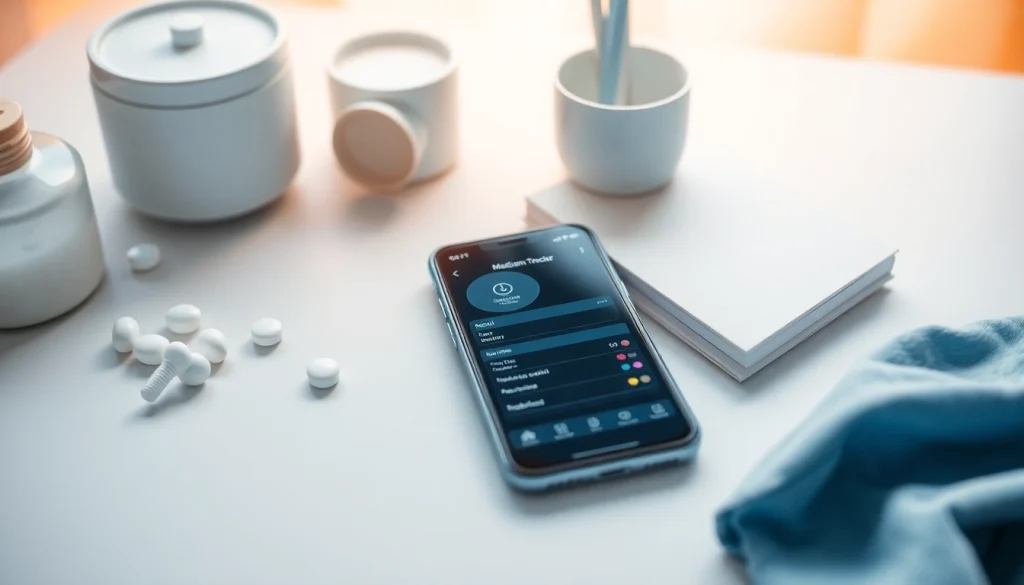
Understanding the Medicine Tracker: What It Is and How It Works
A Medicine Tracker is an essential tool that helps individuals manage their medication intake effectively. It provides a systematic way for patients to keep track of their prescriptions, dosages, and schedules, ensuring that they adhere to their treatment plans. By utilizing features that remind users when to take their medications, these trackers are pivotal in enhancing patient compliance and health outcomes. For individuals seeking to streamline their medication regimen, a comprehensive Medicine Tracker is invaluable.
Key Features of a Medicine Tracker
Medicine Trackers typically come with a variety of features designed to facilitate easier management of medications. Some of the most common features include:
- Reminder Notifications: Alerts to remind users when it’s time to take their medication.
- Dose Tracking: Capability to log when medications were taken or missed, helping users keep an accurate history of their adherence.
- Integration with Health Data: Many trackers can sync with other health applications or devices, allowing for a centralized health management approach.
- Medication Library: A built-in database of common drugs to help users input and manage their prescriptions easily.
- Reports and Insights: Users can receive regular summaries of their medication usage, aiding in discussions with healthcare providers.
The Role of Medicine Trackers in Patient Compliance
Patient compliance is crucial for effective treatment, as medication non-adherence can lead to adverse health outcomes. Medicine trackers play a vital role by:
- Providing Accountability: Users can visibly track their medication habits, which fosters a sense of responsibility.
- Reducing Forgetfulness: Automated reminders help combat common barriers such as forgetfulness, which is a major challenge in medication adherence.
- Enhancing Communication: By maintaining a log of medication usage, users can provide their healthcare providers with accurate information, leading to better-informed treatment decisions.
Comparing Different Medicine Tracker Options
With numerous options available in the market, it’s important to compare different medicine trackers. Some notable contenders include:
- Medisafe: An acclaimed app that has received high ratings for its usability and comprehensive features, including drug interaction warnings and customizable reminders.
- MyTherapy: Known for its user-friendly interface and additional features like health journal tracking and physical activity logging.
- Apple Health: Provides built-in medication tracking features for iPhone users, allowing seamless integration with existing health data.
Benefits of Using a Medicine Tracker for Health Management
Utilizing a medicine tracker offers numerous benefits that can significantly enhance health management:
Improved Medication Adherence and Safety
By consistently reminding patients to take their medications, medicine trackers help ensure that doses are not missed. Various studies indicate that features like reminders can improve adherence rates by up to 50%. This not only increases the effectiveness of treatments but also lowers the risk of adverse events associated with missed doses, ultimately enhancing patient safety.
Personalized Reminders and Notifications
Medicine trackers allow users to receive notifications tailored to their specific medication schedules. Users can customize reminders based on their preferences, which leads to greater engagement. Personalized notifications can include not just reminders but also texts about potential side effects or instructions on what to do in case of missed doses.
Insights into Your Medication Patterns
Advanced medicine trackers will analyze the data collected over time, providing users and healthcare professionals insights into adherence patterns. This can reveal trends, such as certain times of day when medications are frequently missed, enabling proactive adjustments to treatment plans or lifestyle changes.
How to Choose the Right Medicine Tracker for Your Needs
Choosing the best medicine tracker involves assessing different factors to ensure a suitable match for your requirements:
Assessing User-Friendly Features
When evaluating various options, prioritize trackers that are intuitive and user-friendly. Check for customizable interfaces, ease of entering medication data, and clear navigation. Applications with engaging designs can also promote regular use.
Evaluating Integration with Healthcare Providers
Consider how well the medicine tracker integrates with your healthcare provider’s systems. Features that allow healthcare providers to access medication logs can facilitate better-informed conversations about your treatment and help personalize care plans.
Reading Reviews and User Experiences
Before committing to a particular tracker, it’s beneficial to read reviews and user testimonials. Insights from actual users can provide a clearer idea of a tracker’s effectiveness and reliability. Platforms like app stores often have comprehensive user feedback, which can be a valuable resource.
Implementing a Medicine Tracker in Your Daily Routine
Implementing a medicine tracker requires some initial setup and routine adjustments, but the long-term benefits are substantial:
Steps to Download and Set Up Your Medicine Tracker
Start by selecting a suitable app that aligns with your needs. Follow these steps to set it up:
- Download the app from a verified source (Google Play Store or Apple App Store).
- Create an account and input your information, including your medication details.
- Set up your personalized reminder schedule based on your prescribed regimen.
- Explore additional features like health logging if offered.
Best Practices for Daily Use
For optimal results, consider implementing these best practices:
- Check the app daily to log medications and read notifications.
- Incorporate reminders into your regular routine, linking them with daily activities, such as brushing your teeth or meals.
- Share your medication logs with caregivers or healthcare professionals during appointments.
Maximizing the Effectiveness of Medicine Trackers
Beyond simple use, maximizing the utility of a medicine tracker can involve:
- Engaging with any built-in motivational features like tracking streaks or receiving virtual rewards for compliance.
- Regularly reviewing adherence reports to identify areas for improvement.
- Adjusting reminder settings if you notice consistent issues with specific times of day.
Evaluating the Success of Your Medicine Tracker
To ensure that your medicine tracker effectively meets your needs, it’s essential to evaluate its performance regularly:
Metrics to Track Medication Compliance
To measure compliance success, consider tracking the following metrics:
- Percentage of doses taken on time versus missed doses.
- Trends indicating frequent non-adherence at specific times or days.
- User feedback on how the app affects their adherence habits.
Adapting Your Approach Based on Insights
The insights derived from monitoring your adherence patterns are invaluable. Use them to approach your healthcare team for adjustments in treatment if necessary. This evidence-based dialogue enhances the likelihood of personalized medication plans and better health outcomes.
Sharing Information with Your Healthcare Team
Regularly sharing data with your healthcare providers fosters a collaborative approach to your health management. Utilize the reporting features of your medicine tracker to compile and present your medication adherence stats during medical visits.






